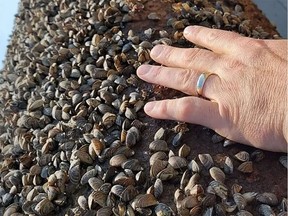
Article content
The province is urging Manitobans to help slow the spread of zebra mussels and other aquatic invasive species (AIS) now that boating season is underway and warning there could be fines imposed on those who don’t comply with current AIS regulations.
Advertisement 2
Story continues below
Article content
“During open water season, Manitobans are reminded to remain vigilant and do their part to protect the province’s water bodies from aquatic invasive species,” the province said in a Thursday media release.
The statement comes as invasive zebra mussels have continued to spread in Manitoba lakes and rivers over the last 10 years. The mussels were first discovered in Lake Winnipeg in the fall of 2013, and have since spread to other bodies of water including Lake Manitoba, the Nelson River, and most recently Clear Lake.
Parks Canada confirmed earlier this month they will temporarily ban all personal watercraft from Clear Lake, including motorized vessels and non-motorized items like canoes, and paddle boards, as they attempt to eradicate zebra mussels from the lake.
Article content
Advertisement 3
Story continues below
Article content
The province said they are asking those who use watercraft in all Manitoba waterways to help prevent the further spread.
“To prevent the spread of AIS, water users are required to clean, drain and dry watercraft and water-related equipment when removing them from a water body. Water users must also adhere to prescribed decontamination requirements when operating in AIS control zones,” the province said.
“These sequential clean, drain and dry steps are legally required for both motorized and non-motorized watercraft, including power boats, jet skis, sailboats, standup paddle boards, canoes and kayaks, as well as all water-related equipment.”
The province added their annual watercraft inspection program is now in operation, with six stations open, and more opening in the coming weeks.
Advertisement 4
Story continues below
Article content
“Inspection stations help water users to be compliant with AIS requirements,” the province said. “Anyone transporting motorized or non-motorized watercraft over land must stop at all open watercraft inspection stations along their route. Failure to stop at an open watercraft inspection station can result in a $672 fine.
“It is also important to remember to remove the watercraft drain plug when transporting watercraft over land. The fine for not removing the plug is $237.”
Adult female zebra mussels are known to reproduce at a rapid rate, as they can typically produce 30,000 to 40,000 eggs in each reproductive cycle, and over 1 million eggs in a single year.
The mussels can be harmful to Manitoba waterways, as they are known to deplete native fish populations, and they can be sharp and a nuisance when they wash up on shores and beaches. They can also cause damage to boats and other aquatic vehicles, as they clump and can clog engine parts and machinery.
The mussels have also been a costly concern for Manitoba Hydro recently, as the Crown corporation announced last year it would spend about $2 million to try to prevent damage to six of their generating stations along the Nelson River, where they say the infestation of the mussels has been growing and spreading, and causing clogging to intake pipes, which has slowed operations and caused safety hazards.
— Dave Baxter is a Local Journalism Initiative reporter who works out of the Winnipeg Sun. The Local Journalism Initiative is funded by the Government of Canada.
Article content
Comments